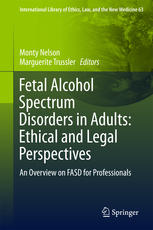

Most ebook files are in PDF format, so you can easily read them using various software such as Foxit Reader or directly on the Google Chrome browser.
Some ebook files are released by publishers in other formats such as .awz, .mobi, .epub, .fb2, etc. You may need to install specific software to read these formats on mobile/PC, such as Calibre.
Please read the tutorial at this link: https://ebookbell.com/faq
We offer FREE conversion to the popular formats you request; however, this may take some time. Therefore, right after payment, please email us, and we will try to provide the service as quickly as possible.
For some exceptional file formats or broken links (if any), please refrain from opening any disputes. Instead, email us first, and we will try to assist within a maximum of 6 hours.
EbookBell Team

0.0
0 reviewsThis book discusses and provides insight on the legal and ethical dilemmas of managing those with Fetal Alcohol Spectrum Disorder (FASD). This book provides a clear perspective for those clinicians and legal professionals who are working with those with this disorder, and correspondingly increases their understanding when arranging effective supports for this population. Historically, the primary focus on FASD has been on children. However, this is a lifelong disorder and the implications of this disorder become even more prominent and complex in adulthood. Those with this condition can struggle with impulsiveness, and a host of cognitive difficulties. This correspondingly impacts their independence and employability, and produces an elevated risk for homelessness and other residential issues, involvement in substance use, being exploited, development of behavioural issues, and subsequent legal difficulties. Their cognitive difficulties result in challenges for legal systems around the world to understand their issues, and to design appropriate remedial strategies, recommendations for treatments and supports, and even for understanding the failure of many of these individuals to be able to change their behaviours effectively. This produces various legal and ethical dilemmas, which are discussed in detail in this volume by 28 authors from Europe, New Zealand and North America. These include discussions regarding the rights of the unborn child, the alcohol industry’s duty to warn, whether small amounts of alcohol during pregnancy can be condoned, and even the current use of involuntary hospitalization for addicted mothers. Other chapters discuss the need for training on FASD for front line officers, use of lies during interrogation of those with FASD, medical and legal interventions for offenders with FASD, access to diagnostic services and follow-up supports, and whether FASD can be considered a mitigating factor for sentencing. Furthermore, caregivers also provide their stories regarding the daily dilemmas that are faced in raising those with FASD.